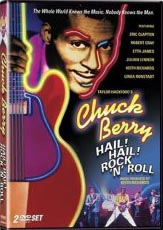Chuck Berry's rock and roll template
 Maybe Eric Clapton said it best when he claimed that the whole sound of rock and roll comes directly from Chuck Berry's guitar lines. But even that isn't close to the best quote that comes from the movie Hail! Hail! Rock 'n' Roll, recently made into a lavish multi-DVD presentation.
Maybe Eric Clapton said it best when he claimed that the whole sound of rock and roll comes directly from Chuck Berry's guitar lines. But even that isn't close to the best quote that comes from the movie Hail! Hail! Rock 'n' Roll, recently made into a lavish multi-DVD presentation.Originally released in 1987, director Taylor Hackford (who would later do the acclaimed bio-pic Ray) already knew that he was going to have a hell of a time filming his subject. The plan was to have everything revolve around a home-town 60th birthday concert in St. Louis featuring Keith Richards (Berry's most accomplished disciple) and other musical celebs. Berry though is a famously prickly character- he tours alone, appears with local pick-up bands, takes an extra cut from management (only giving some back if the band and equipment are good) and only stays on stage for exactly the amount of time he's contracted for.
On the recent reissue, Hackford talks about some of the difficulties he had working with Berry, including making lengthy and painful financial arrangements with CB as star and producer. In interviews, Keith Richards and Jerry Lee Lewis both recall fights that they've had with Berry where he emerged victorious. Even during the rehearsal sessions, Richards and Berry go at it, arguing over the use of an amplifier- Berry exclaims that if people are going to hear him (speaking in the third person) they're going to hear him right and when Richards counters that this music is going to be around long after they're gone to put things in perspective, Berry snaps back that he simply isn't going to die. After the show, Richards says "He's given me more headaches than Mick Jagger but I can't dislike him" (not exactly lovey-dovey but this is Richards). Similarly, interviews with Berry's wife and secretary are disconcertingly brief, cut off quickly and uncomfortably.
But more than just being a difficult character, the film also presents Berry as a complex person. Yes, he's tight-fisted with demanding gig money up front and only playing exactly for the prescribed amount of time but we also see him speaking calmly and reflectively about his past. He shows off a slew of cars he bought in the 70's and sly tells us that though he couldn't find buyers, he'll still hold on to them for years and sell them to us for a nice profit. With that, he smiles and slides out of view. He also appears in a get-together of historic proportions with Bo Diddley and Little Richard as the three discuss the difficulties each faced being a black performer trying to break into the pop world of the 1950's.
But even with the solo interviews (Roy Orbison, Jerry Lee, Bruce Springsteen (jubilantly recalling when he backed up Berry) and the Everly Brothers), the highlight of the film and what it's built around is the birthday show. As opposed to the usual pick-up bands that are assembled on the spot for most Berry shows, Richards assembled an all-star band with Berry's old running buddy pianist Johnny Johnson, Robert Cray and Richards himself trading off solos. Though it's historic, the concert is still rough around the edges- Berry kept changing songs around, even during show after weeks of rehearsals and as revealed in the DVD extras, he had to re-record vocals from the concert later.
Nevertheless, you're still caught up in a big moment with the hometown crowd acting ecstatic, dancing in aisles, holding up banners. Eric Clapton does a great cameo on "Wee Wee Hours," taking an extra 2nd solo at Berry's insistence. Oddly enough, though it sounds questionable on paper, Julian Lennon and Linda Ronstadt sound good at the show, with the former shouting out like dad ("don't he sound like his pa?" Berry exclaims) and Ronstadt reviving her great take on "Living in the USA." Add in Etta James bringing down the house near the end on "Rock and Roll Music" and Berry being driven on stage for the finale and you have a hell of a show (though it seems from Cray's entrance and later incorporation into the band that the songs aren't shown in exact sequence).
Near the end of the film, Berry's asked how he wants to be remembered. He pauses to think and then says that whatever people say about him, he wants it to be real, whether it's good or bad. In that way, Hackford has honored his subject by presenting him as close to how we'll ever see Berry as he really is.

1 Comments:
Rock and roll definitely came from Chuck's guitar, but it came from his pen as well. He was one of the first rock and rollers to write songs aimed directly at teenagers, and he did it with wit and precision. Two things Clapton isn't known for.(Sorry, couldn't resist). You can draw a line from Chuck right up to the Ramones with those songs.
Anyway, Chuck Berry doesn't get nearly enough credit for his songwriting as he does for his guitar work. If it was just the guitar, he would have been great. Add the songwriting (and his vocal skills), and the guy's a genius.
Post a Comment
<< Home